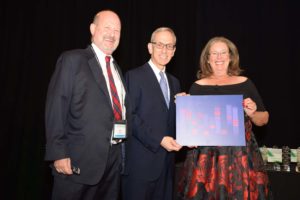Marvin J. Slepian, MD, Arizona Bioscience Pioneer Award for Lifetime Achievement recipient to host ISMCS 2017 in Tucson
This Week, October 16-18, Dr. Slepian Brings the International Society for Mechanical Circulatory Support (ISMCS) to Tucson with the Goal of Helping Heart Failure Patients Live Longer, Better Lives

Marvin J. Slepian, M.D., was honored with the Arizona Bioscience Pioneer Award for Lifetime Achievement at the 2017 AZBio Awards on Oct. 11, 2017
TUCSON, Ariz. – Oct. 16, 2017. The Arizona BioIndustry Association (AZBio) honored Marvin J. Slepian, MD, with their Pioneer Award for Lifetime Achievement during Arizona Bioscience week (Oct. 8-14).
This week Dr. Slepian, as immediate past president and current Scientific Congress Chairman, is responsible for bringing the 25th International Society for Mechanical Circulatory Support (ISMCS) annual congress to Tucson, Oct. 16-18. The 2017 Congress title and theme is “Limitations, Controversies and Gaps in Mechanical Circulatory Support: Pathways to Solutions.” Last year’s conference was in Mito, Japan.
Dr. Slepian is a cardiologist, inventor, entrepreneur, educator and innovator. At the University of Arizona he serves as professor of medicine, professor and associate department head of biomedical engineering, professor of material sciences and engineering, professor of medical imaging, McGuire Scholar in the UA Eller College of Management and member of the UA Sarver Heart Center.
Dr. Slepian is also the founder and director of the newly created Arizona Center for Accelerated Biomedical Innovation (ACABI) – a “creativity engine” focused on novel solution development for unmet medical needs. He has created many businesses that have been acquired by international healthcare companies. In Tucson he was one of three cofounders of SynCardia that manufactures the Total Artificial Heart.
Heart disease is the leading cause of death in the modern world. More people die of heart problems than all cancers combined. According to the U.S. department of Health and Human services, over 4,000 patients are waiting for a donor heart and the list is growing. Meanwhile, the annual supply of 2,000-2,500 donor hearts has been flat in the U.S. for over 20 years. There are simply not enough donor hearts for patients who need them.
“There is a growing epidemic of advanced heart failure with nearly 200,000 patients in the U.S. alone in need of cardiac assist and replacement. For this larger group, mechanical circulatory support (MCS) has emerged as the mainstay of therapy to increase survival and quality of life. The ISMCS congress is directly addressing approaches to enhance the efficacy and safety of these devices,” said Slepian.
When patients waiting for a matching donor heart run out of ‘time’, MCS devices will pump blood for the body. These devices are used as a bridge to transplant until a matching heart can be found. However, many people on the waiting list become too sick or die before transplant. These individuals, and others who are not eligible for a donor heart, can use this technology to live longer and better lives. These MCS devices are known as ventricular assist devices and artificial hearts.
“Only in squarely addressing and tackling limitations that remain with these systems will this promising field advance, which has the potential to help so many with advanced heart failure. Our goal at ISMCS is to make living with this technology similar to having an artificial hip or knee,” said Slepian.
Innovation Challenge – High-tech Medical Hackathon
Leveraging one of today’s creative formats there are 15 teams including world-wide scientists, surgeons, engineers and students that have been working for six weeks through virtual collaboration to address over 15 complex issues. Issues include: Transcutaneous Energy Systems (powering devices through the skin); miniaturization of MCS peripherals; smart pumps; remote monitoring and improving power supplies. The best ideas will win awards at the meeting and help lead to improving patients’ quality of life.
In addition to a world class faculty representing six continents, noted attendees include University of Arizona President, Robert C. Robbins, University of Arizona College of Medicine, Dean Charles B. Cairns, MD, FACEP, FAHA, and University of Arizona College of Engineering Dean Jeffrey B. Goldberg, PhD, along with Tucson Mayor, Jonathan Rothschild. The Congress program includes a Young Investigator Symposium, an Opening Ceremony, and four Keynote Speakers: Jeff Teuteberg, MD, Stanford University, Stanford, CA; Doris Taylor, PhD, Texas Heart Institute, Houston, TX; Richard Wampler, MD, Oregon Health and Sciences University, Portland, OR; and Robert Kormos, MD, University of Pittsburgh, Pittsburgh, PA.
###
Media Contact
Don Isaacs
medcom.don@gmail.com
520-955-0660
Follow ISMCS Annual Congress: Facebook | Twitter | LinkedIn | Instagram | Website
